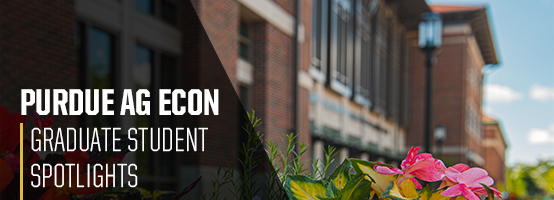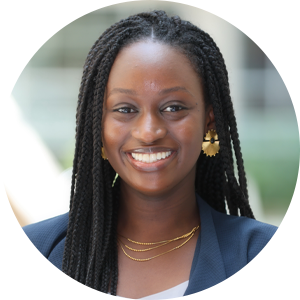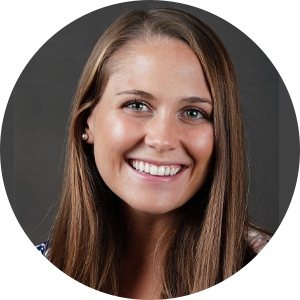Purdue Ag Econ Graduate Program'S
VIRTUAL RECRUITMENT WEBSITE
ACADEMIC YEAR: 2024-2025
Being a Boilermaker is about taking action, creating smart and innovative solutions to big problems. We are the instigators of progress, we love what we do, and love that our work helps move the world forward. It's the small steps we take, that lead us in the pursuit of the next Giant Leap. Join Purdue's Department of Agricultural Economics and become part of the generations of Boilermakers who have and continue to leave their mark on the world. We hope to see you in August of 2024! Boiler Up!
Welcome to the Agricultural Economics Department's Virtual Graduate Recruitment Website. We are excited to showcase our Department to you virtually and to show you why this is a Department culture that you will be proud to be a part of. Below you will find videos from our faculty members, links to our Research Centers located within the department, as well as stories about our students. Note, we will be updating this site over the coming months to provide you with the most up to date information related to graduate recruitment for the August 2024 semester.
Graduate Program Overview
Carson Reeling, Associate Professor and Graduate Program Chair, provides an overview of the Purdue Agricultural Economics graduate program.
Common Questions and Program Information:
Many frequently asked questions related to our department and graduate studies, such as admission, financial aid, program requirements, and contact information can be found on our Graduate Program Page.
Ryan Good, Graduate Program Coordinator for the Department of Agricultural Economics, provides an overview of our graduate programs and notes important deadlines for prospective graduate students.
Office Phone: +1-765-496-2447
Cell phone: +1-765-714-2771
Email: tnance@purdue.edu
CAREER PLACEMENT
Dr. Jake Ricker-Gilbert is the graduate student placement coordinator for the Department of Agricultural Economics at Purdue. In this video, he talks about his role as placement coordinator and the ways that the ag econ department helps graduate students prepare for the job market. You can view our most recent career placements here.

LEARN MORE ABOUT OUR graduate students
We asked graduate students to share their path to Purdue as well as their experiences in the ag econ graduate programs. We hope their profiles will give you insight into what it is like to be a graduate student in Purdue’s Department of Agricultural Economics. Read more about them below and on our Graduate Student Spotlights Page.
Diamilatou Kane
DIAMILATOU KANE IS CONDUCTING FIELD RESEARCH TO BETTER UNDERSTAND FOOD SAFETY AND CONSUMER BEHAVIOR IN SENEGAL

Hari Regmi
A UNIQUE JOURNEY, GRADUATE STUDENT STAYS DEDICATED TO HIS GOALS

Gloria Lenfestey
GRADUATE STUDENT TRAVELS ABROAD TO EXPLORE AGRICULTURAL PRACTICES AND POLICY
Learn about Purdue AG ECON faculty members
Faculty Program Highlights
Maria Marshall, is the James and Lois Ackerman Professor of Agricultural Economics at Purdue University, Director of the North Central Regional Center for Rural Development and the Director and Founder of the Purdue Institute for Family Business. Dr. Marshall conducts an applied research, teaching, and Extension program in small and family business management, disaster recovery, and entrepreneurship.
Valerie Kilders, Assistant Professor of Agricultural Economics, shares insights into her research on choices.
Dr. Nicole Olynk Widmar, Department Head, discusses the advantages of the MS/MJ dual degree program offered by Purdue University's Department of Agricultural Economics and Indiana University Robert H. McKinney School of Law. The program consists of the Master of Jurisprudence (MJ) and Master of Science (MS) in Agricultural Economics, bringing together expertise from two highly ranked institutions to provide a unique educational opportunity in agricultural law.
Research Centers
The Center for Food & Agricultural Business creates and delivers management education programs that combine research with real-world application specifically for the food and agribusiness industries. They offer several programs and workshops on a wide range of agribusiness topics, create custom programs for agribusiness companies, and are home to the MS/MBA in Food and Agribusiness Program.
The Center for Commercial Agriculture is a source of management education and knowledge generation for the farmers in the business of producing the world's agricultural products. Each year they host the Top Farmer Conference and Farm Management Tour. They also produce the Ag Economy Barometer and the Crop Basis Tool. The center host numerous webinars on insurance, risk, crop outlook, and other related topics.
The Center for Food Demand Analysis and Sustainability (CFDAS) at Purdue tracks consumer insights and the economics of the food system. Timely reports on trends and emerging topics can guide research on nutrition and plant innovations, and reveal how policy impacts food markets.
These insights will not only help consumers make more informed decisions but also help farmers, agribusinesses and policy makers improve the food system.
The Center for Global Trade Analysis coordinates the Global Trade Analysis Project (GTAP), a global network of researchers and policy makers conducting quantitative analysis of international policy issues.
The Center for Regional Development partners with public, private, nonprofit and philanthropic organizations to identify and enhance the key drivers of innovation in regions across Indiana, the U.S. and beyond. These drivers include a vibrant and inclusive civic leadership, a commitment to collaboration, and the application of advanced data support systems to promote sound decision-making and the pursuit of economic development investments that build on the competitive assets of regions. Recent research initiatives include: Digital Divide and Broadband studies.
Agri-food systems are large and complex with many actors – from the type of food we eat to the way it’s produced, transported, and delivered.
Consumers increasingly want to know more about the food they eat and the products they buy, but in order to provide a more transparent, safe, and sustainable food supply, we must improve connectivity and strengthen our food and agriculture systems.
The Digital Innovation in Agri-Food Systems Laboratory (DIAL) is rethinking the agri-food sector by creating connections across fragmented ecosystems to deliver digital innovation and new businesses that meet specific industry needs, and in turn, provides consumers with access to healthy, affordable, sustainable, and transparent food.
We develop entrepreneurs and ideas to create and fund high-value startup companies for the agri-food industry.
The Indiana Council for Economic Education is the lead unit in an 11-institution network of university centers for K-12 economic education in Indiana. The center is affiliated with the National Council for Economic Education.
For almost 50 years, the North Central Regional Center for Rural Development (NCRCRD), funded by the U.S. Department of Agriculture’s National Institute of Food and Agriculture and the land-grant universities in the 12-state region, has addressed issues critical to the growth and impact of rural communities. NCRCRD works to establish collaborative working relationships across the region to address emerging and continuing issues of interest to rural communities and is part of a group of four centers that together cover the entire United States. The four centers work collaboratively on issues that cross regional boundaries. NCRCRD’s works focuses on three interconnected systems: communities, businesses, and households; and three major themes: resilient communities and economies, leadership and civic engagement, community health and wellness.
The Purdue Institute for Family Business conducts research, teaching and Extension programs focused on family businesses
The State Utility Forecasting Group assists the State of Indiana through its forecasts of electricity consumption, prices, and resource requirements. SUFG also performs analyses of a number of issues facing the energy industries
